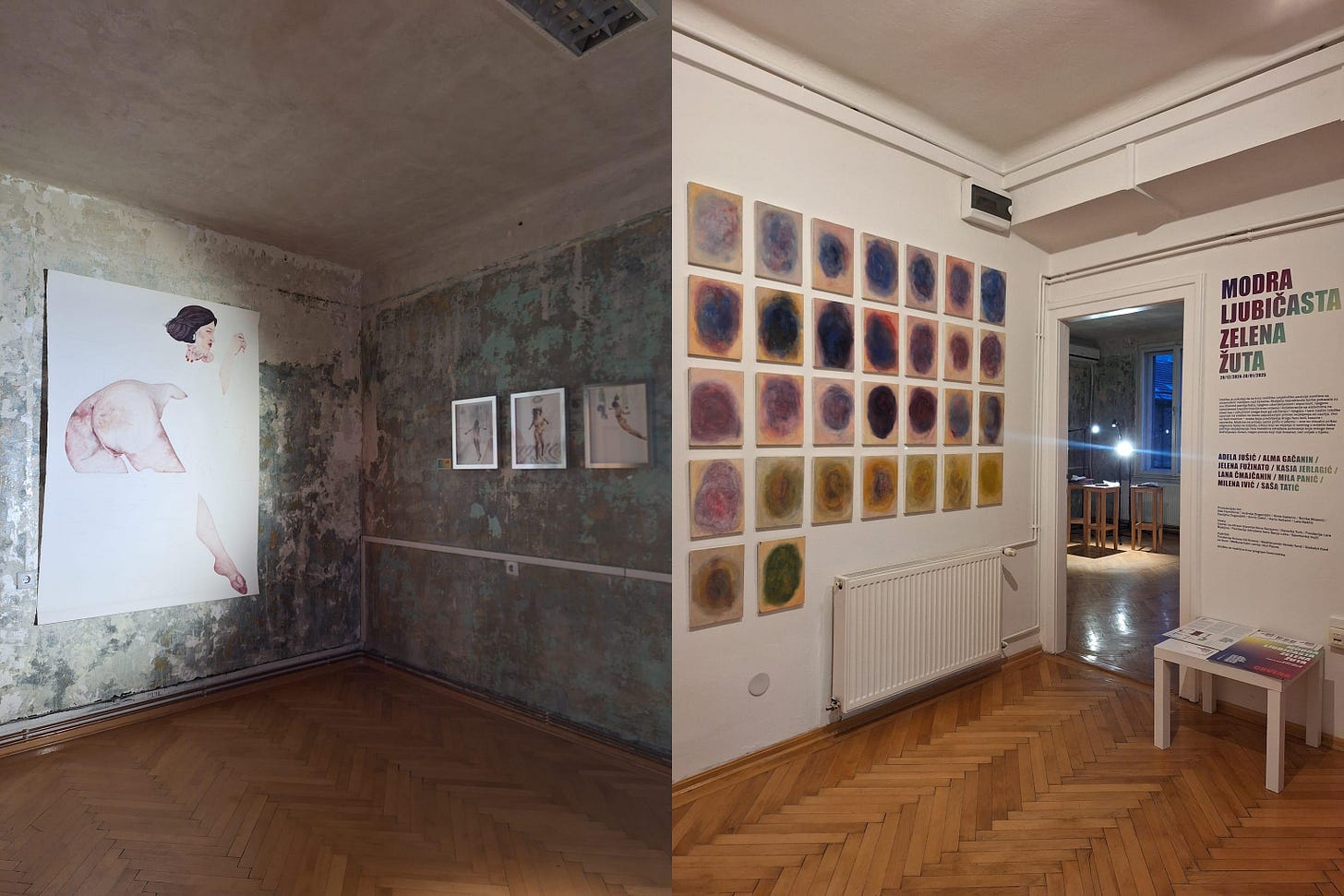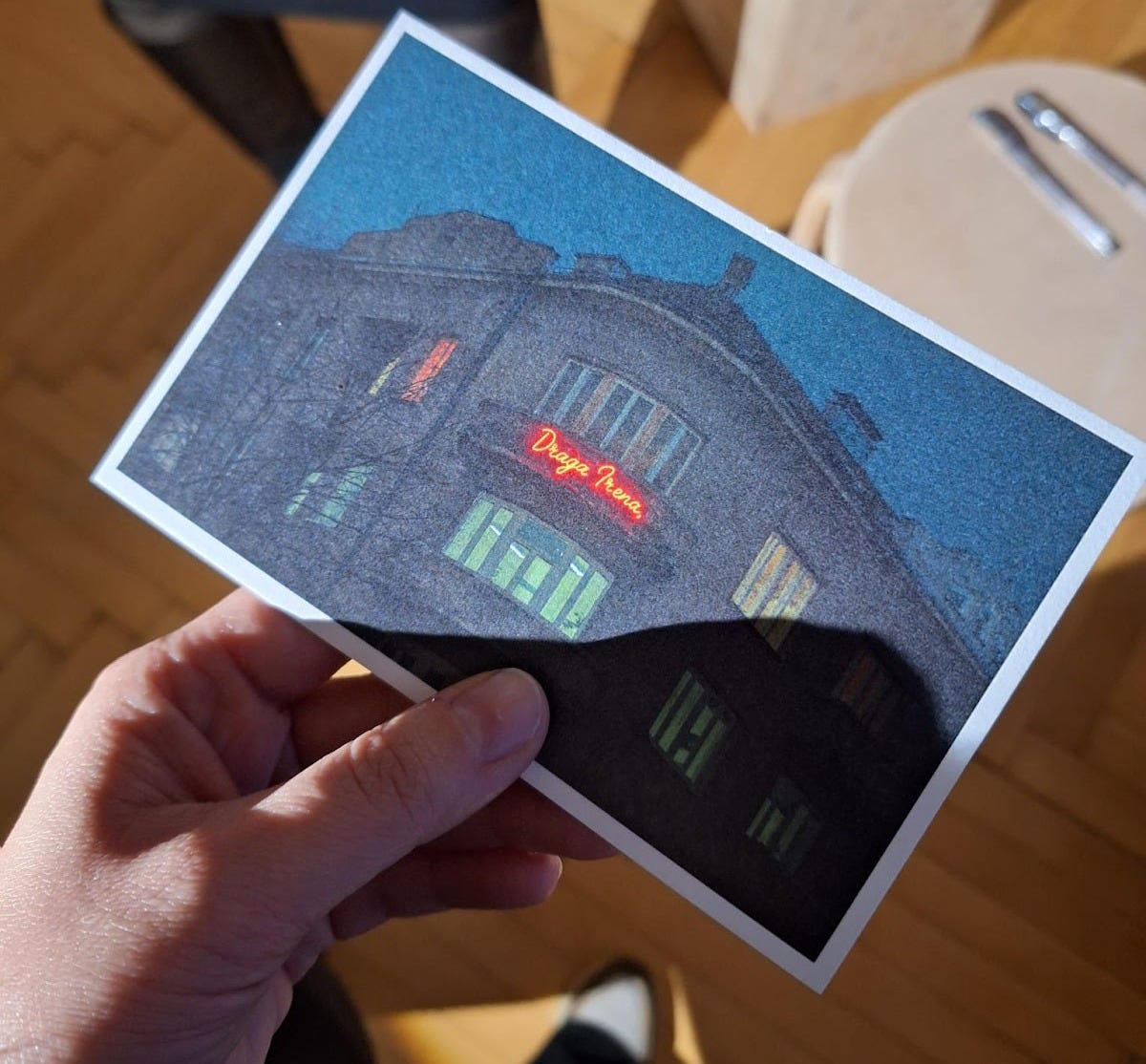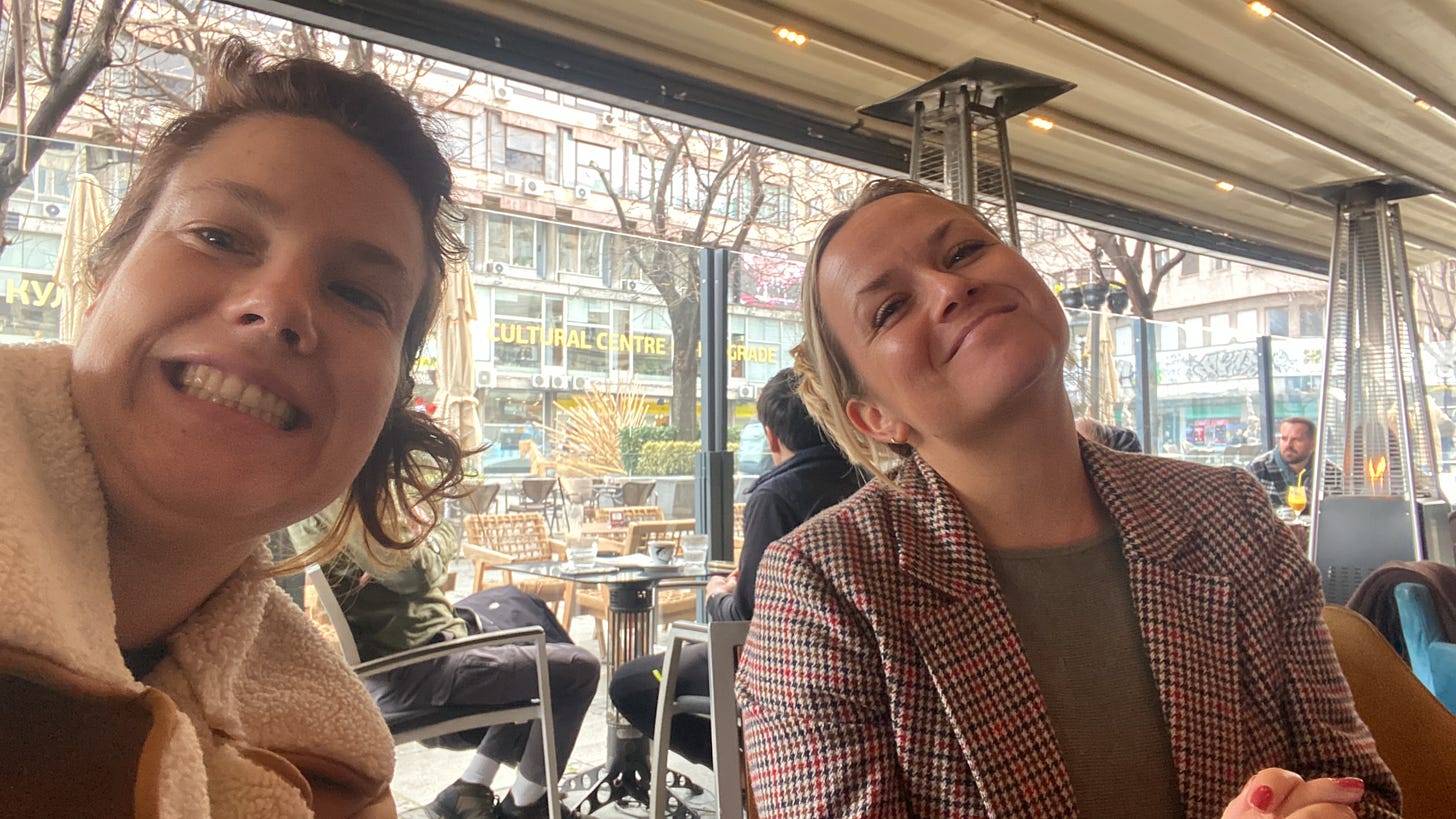Balkan Unscripted (#3)- Eggs, Dodik's 'coup', Vlad the Impaler & kickass art
Your bi-weekly deep dive into the Balkans—stories, discoveries, and the conversations that matter. Curated with care by Ingrid and Marjolein, your go-to Balkan nerds.
Political circus or some powerful art?
Hi all,
Even though the last two weeks in the Balkans were all about Dodik’s trial and the chaos in Serbia’s parliament (more below), I think it’s also important to write about other stuff than nationalist politicians and their pursuit of dominance and control.
Let’s talk about some powerful, inspiring and creative women instead.
Last January, when I (Marjolein) was in Sarajevo, I visited the exhibition ‘Modra, Ljubičasta, Zelena, Žuta’, which is about violence against women by the feminist collective Crvena. The title of the exhibition refers to the colors that a bruise gets over time. Sadly, the exhibition is no longer open, but, still, I would like to take this opportunity to highlight its significance and honor the artists.
I was welcomed by Alma Gačanin, one of the artists who contributed to this exhibition. She told me how she normally creates work about women who are strong, outspoken, fierce, for example by portraying them in, for example, animal prints and with a whip. It is clear — these women are in charge. Her paintings in this exhibition, however, showed the more vulnerable side of female life in the Balkans.
I was touched by the images — in mind the stories about violence against women in Bosnia. Not only news articles about femicide, but also from other reporting. Like the horrible example of a man who live streamed killing his ex-wife, two others and himself. The woman did seek police protection, but unfortunately institutions did not act on her appeals. Too often, I hear stories like these — not just from the media, but also from women whom I know personally (as well as their family members).
Another piece in this exhibition I would like to share is ‘Draga Irena’, a neon light hanging on the balcony of the corner apartment where the exhibition was held. Milena Ivic made this to show solidarity with Irena Karic, a women who, after many years of terror, abuse and sexual violence, killed her husband. She was convicted of murder and is serving a sentence of 9 years and 6 months in prison. Inside the exhibition there were postcards that would be delivered to Irena, to give her support.
The case of Irena is certainly not rare in Bosnia and neighbouring countries. For years women have had to endure violence and humiliation from their partner. Institutions do not give adequate support, refrain from punishing the perpetrators or simply don’t listen. As a result, many Balkans women’s prisons are full of women who have murdered their husbands or ex-partners. It reminded me of this photo series I recently saw, of female prisoners in Moldova.
So last Saturday 8th of March, International Women's Day, was certainly not a day of celebration, but a much needed (sometimes cheerful) fight for equal rights.
čuvaj se!
Marjolein
What you need to know
Milorad Dodik, the president of Republika Srpska in Bosnia-Herzegovina, rejects prosecutor summons over separatist laws. He has barred Bosnian authorities from Republika Srpska , sparking fears of a ‘coup’ that could break up Bosnia.
Feb 26. Dodik was sentenced to a year in prison and given a six year ban from politics by the Court of Bosnia and Herzegovina in Sarajevo for defying the orders of High Representative Schmidt, overseeing the Dayton peace agreement.
March 6. Dodik passed several controversial laws. For example, one declaring that decisions made by Bosnia's Constitutional Court are not applicable within the RS, rejecting the court's authority in the entity. He also prohibited the operations of the BiH Court and Prosecutor’s Office and other law enforcement actors, and established a separate judicial and prosecutorial council. He also passed the “foreign agent law”, which increased governmental control over NGO’s and media in the RS and reintroduced the criminalization of defamation.
March 7. Bosnia's Constitutional Court temporarily suspended Dodik’s laws. The court labeled these laws as a threat to the constitutional order, following appeals from politicians who viewed the legislation as an attack on BiH's sovereignty. Dodik has rejected the court's authority and vowed to ignore the verdict. International reactions include condemnation from the EU and expressions of concern from the U.S. Embassy in Bosnia. Russia has shown support for Dodik.
March 10. NATO’s Secretary-general Mark Rutte visited Sarajevo and said NATO is committed to and fully supports the sovereignty and territorial integrity of Bosnia and Herzegovina. He also highlighted that its up to the three members of the presidency to take responsibility for the stability and security of the country.
It’s has become almost impossible to keep up with everything Dodik is saying, or not saying. Tomorrow a new episode of our favorite podcast De Balkanman will be made available online, with some more discussions about the court case and consequences.
Serbia's parliament descended into chaos on March 4, 2025. Opposition lawmakers in Serbia accused the ruling majority of trying to pass multiple decisions without confirming Prime Minister Milos Vucevic's resignation, leading to protests where they blew whistles and displayed banners reading, "Serbia has risen so the regime would fall!" The situation escalated with flares and smoke bombs inside the assembly hall. Outside, eggs were being thrown. At least three lawmakers were injured. This violent episode once again underscores Serbia's deepening political crisis.
Albania’s TikTok ban. Albania's Minister of Education confirmed the year-long ban on social media site TikTok. PM Edi Rama first proposed a ban in Dec., a month after the fatal stabbing of a 14-year-old following a series of arguments on social media.
Quirky corner
Romania’s failed ‘Vlad the Impaler’ coup. The Romanian government detained six people for allegedly seeking Russian support to overthrow the government. The group, named “Vlad the Impaler Command” after Romania’s medieval ruler who served as inspiration for Dracula, included 101-year-old retired general Radu Theodoru, who is known for his antisemitic views. Two members of the group traveled to Moscow in January and allegedly contacted Russian agents to discuss Romania's withdrawal from NATO, the dissolution of political parties, and the establishment of a new government. Romania expelled two Russian diplomats.
Egg throwing techniques. Protestors in front of the Serbian parliament were photographed throwing eggs (and other stuff) on the government building, where MPs were holding a parliamentary session earlier this week. On X, people showed exactly who protestors really took an aim at. Belgrade based documentary photographer Sanja Knežević also managed to capture the best techniques for throwing the eggs.
The end of the winter. Across the Balkan, carnival takes place on the last day before Easter fasting. Symbolically, carnaval marks the end of winter and, in some countries, is aimed at chasing away evil spirits, praising fertility and upcoming spring. Look at some of these beautiful photos of carnival of Kamarades collective in Belgrade.
Meme of the week
Minister Aleksandar Vulin, Serbia’s ex-spy chief, seems unfazed (perhaps even amused) by this week’s turmoil in the Serbian parliament. His reactions have sparked an outburst of meme’s on TikTok. Some social media users, for example, think Vulin would not do too badly at the popular Exit-music festival in Novi Sad… (see below).
Others parodied the scene in the parliament as a gender reveal party goes wrong…
Quiz question
Question of the week. Why do Serbian criminals love the Netherlands?
To find the answer, read this investigation in NRC - which was written by Ingrid Gercama, Mark Middel en Nemanja Rujevic, looking at the links between organized criminals - dealing in narcotics, operating in the Netherlands and Serbia.
Hi, from us
We’re Ingrid & Marjolein, two freelance journalists covering the Balkans. One Saturday night — after a few glasses of rakija — this newsletter was born. In each edition, we share stories that catch our eye, the ones worth reading, along with our observations from reporting in the region. So grab a coffee (or a rakija) and join us.











